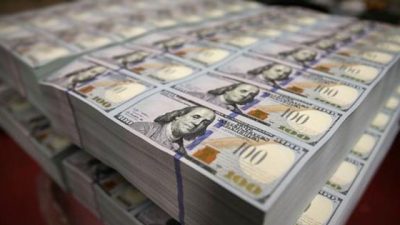Nigeria’s External Reserves Hit $45Bn Mark
Nigeria’s external reserve has hit the $45bn mark in May, up from the $44.7bn it reached earlier in the month.
According to figures revealed by the Central Bank of Nigeria, external reserve has increased by $212.2million in May alone.
Recall that there was a decrease in the reserve in September 2018, which was the last time it stood at $45bn. It has depleted ever since as it hovered around $41bn and $44bn marks.
Further analyses have shown that fluctuations in external reserves have been largely as a result of unstable oil prices on the global market.
However, oil prices have recently taken a surge to $73p/b over the last five months, following the year low that was recorded in January. Oil price was as low as $53.21 as at January 2019, but steadily rose to the $70p/b in mid-April, thanks to the decision of the Organisation of Petroleum Exporting Countries (OPEC) to cut oil prices and maintain stability.
This has ensured big oil-producing nations have been at the forefront of the cut.
There were predictions by analysts that oil prices will rise up to $70pb, a price that has been predicted to factor in helping Nigeria’s oil reserves to hit the $45bn mark. While oil prices are only expected to keep rising, with the moves made by OPEC and new rules by the International Maritime Organisation (IMO), there will be a further increase in Nigeria’s foreign reserve, ensuring the naira is also stable.

Oil prices have risen to multi-week highs on Monday after OPEC indicated it could maintain production cuts that have helped support prices so far this year.
There have however been an escalation of the tension in the Middle East that has helped the bolstering of oil prices.
Saudi-owned energy giant and the biggest oil production firm in the world, Aramco suffered attack from drones on its pipelines. This has further helped to shoot up oil prices.
Nigeria’s new whistleblowing policy has also helped to generate more funds for the nation’s funds with Zainab Usman, Minister of Finance, saying the nation has generated N8.03billion from the recovered funds.
What Does This Mean To The Naira?
The rise in external reserves implies that the stability of the naira is expected to continue in the long run. In 2018, the Central Bank of Nigeria (CBN) sold a whopping $36.6 billion in forex.
This is a huge rise from $15.8 billion sold in 2017, representing a whopping 130% increase. While explaining the reason for the high volume of transactions, the CBN stated;
“The Increased volume of transactions in 2018 was attributable largely to the bank’s foreign exchange policy and its management, coupled with the improvement in the levels of foreign reserves during the year.”
The recent reappointment of Godwin Emefiele as the Governor of the CBN will also help the stability of the naira as the Investors and Exporters (I&E) window opens.
Emefiele said Nigeria’s current reserve can see the nation through imports for nine months.
”Nigeria’s current stock of external reserves can finance nine months of current import commitments.
”With improved availability of foreign exchange, the exchange rate at the I&E Fx window has remained stable over the past 24 months at an average of N360/$, and the parallel market exchange rate has appreciated from N525/$ in February 2017 to N360/$ today.”


